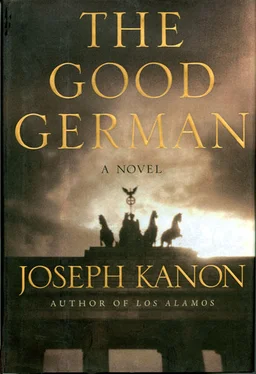“I know this man. He didn’t kill anybody.”
“No? Well, I’d sure like to hear it from him. Ask him about the SS medal while you’re at it, since you know him so well.” He went over to the piano. “Anyway, he’s your lead. You won’t even have to go looking. He’s coming to you.”
“He hasn’t turned up yet.”
“Does he know where you are?” Bernie said to Lena.
She had slumped onto the bench again, staring at the floor. “His father, maybe. His father knows.”
“Then sit tight. He’ll show up. Or maybe you’d rather he didn’t,” he said to Jake. “A little inconvenient, all things considered.”
“What’s gotten into you?” Jake said, surprised at his tone.
“I don’t like putting Nazis in hotels, that’s all.”
“He didn’t do it,” Jake said.
“Maybe. Maybe you don’t want to do the math anymore. Add it up. Two and two.” He gathered the other folders off the piano. “I’m late. Frau Brandt,” he said, a courtesy nod that became a parting shot. He turned to Jake. “It connects.”
He was halfway across the room before Jake stopped him.
“Bernie? Try this one. Two and two. Tully comes to Berlin. But the only one we know he was coming to see was you.”
Bernie stood quietly for a moment. “Meaning?”
“Numbers lie.”
When Bernie left, the room seemed as still and airless as a vacuum tube, the only movement the ticking of the hall clock.
“Don’t mind him,” Jake said finally. “He just talks tough. He likes to be mad.”
Lena said nothing, then got up and went over to the window, folding her arms over her chest and staring out. “So now we’re all Nazis.”
“That’s just Bernie. Everybody’s a Nazi to him.”
“And it’s better in America? Your German girlfriend. Was she a Nazi too? That’s how he looks at me. And he’s your friend. Frau Brandt,” she said, imitating Bernie.
“That’s just him.”
“No, I am Frau Brandt. I forgot, for a little while.” She turned to him. “Now it’s really like before. There are three of us.”
“No. Two.”
She smiled weakly. “Yes, it was nice. We should go now. The rain’s finished.”
“You don’t love him,” he said, a question.
“Love,” she said, dismissing it. She turned to the piano. “I’ve scarcely seen him. He was away. And after Peter, everything changed It was easier not to see each other.” She looked back. “But I won’t send him to prison either. You can’t ask me to do that.”
“I’m not.”
“Yes. I’m the bait-isn’t that what he said? I saw your face-like a policeman. All those questions.”
“He’s not going to prison. He didn’t kill anybody.”
“How do you know? I did.”
“That was different.”
“Maybe it was different for him too.”
He looked at her. “Lena, what is it? You know he didn’t.”
“And you think that matters to them? A German? They blame us for everything.” She stopped and looked away. “I won’t send him to prison.”
He went over to her, turning her face with his finger. “Do you really think I’d ask you to do that?”
She looked at him, then moved away. “Oh, I don’t know anything anymore. Why can’t we leave things as they are?”
“This is the way they are,” he said quietly. “Now stop worrying. Everything’s going to be all right. But we have to find him. Before the others do. You see that.”
She nodded.
“Would he really go to his father? You said they didn’t speak.”
“But there’s no one else. He came for him, you know, even after everything. So.”
“Where were you? Pariserstrasse?”
She shook her head. “It was bombed already. The hospital. He said to wait for him there, but then he didn’t get through.”
“So he wouldn’t know where else to look. He’d try his father.”
“Yes, I think so.”
“Anyone else? Frau Dzuris hadn’t seen him.”
“FrauDzuris?”
“I tried her first, remember? You’re not so easy to find.” He paused. “Wait a minute. She said there’d been a soldier. Maybe that’s why Tully came-to find you.”
“Me?”
“Well, Emil. To get him back. That would explain why he wanted to see Bernie, too-to check the fragebogens. That’s Bernie’s department. Maybe he thought he’d find yours there. Except you didn’t fill one out. Why didn’t you, by the way?”
She shrugged. “A party member’s wife? They would have made me work on the rubble. I couldn’t, I was too weak. And for what, a class V card? I had that much from Hannelore.”
“But Tully wouldn’t have known. I didn’t. So he’d want to check.”
“If he was looking for me.”
“It makes sense. Finding Emil would get him out of a lot of hot water.“
“But if he’d already paid?”
Jake shook his head. “Bernie’s wrong. He didn’t get money from Emil. Russian marks aren’t floating around Frankfurt. He got it in
Berlin.“
“Then why did he let him out?”
“That’s what I want to ask Emil.”
“Now you’re a policeman again.”
“A reporter. Bernie’s right about one thing. Emil’s the only lead I’ve got. There must be a connection-just not the one he thinks.”
“He wants to make trouble for Emil. You can see that. It’s so important, this soldier? Who was he?”
“Nobody. Just a story. At least he was. Now he’s something else. If you really want to keep Emil out of trouble, we’d better find out who did kill him.”
Lena took this in, brooding, then went over to the phonograph and fingered one of the records as if she were waiting for the music to start again.
“A little while ago, we were going to Africa.”
He came up behind her, touching her shoulder. “Nothing’s changed.”
‘No. Except now you’re a policeman. And I’m bait.“ Contents — Previous Chapter / Next Chapter
The next day was hot again. Berlin was literally steaming, the rain that had washed the dust from the air now rising in wisps over the wet ruins, making the smell worse. Emil’s father lived in Charlottenburg, a few streets away from the schloss, in what was left of an art nouveau block of flats, divided into rooms for bombed-out families. The street hadn’t been cleared, so they’d had to leave the jeep on Schloss Strasse and thread their way through the rubble on a footpath dotted with house-number sticks planted in the debris like trail markers. They were sweating when they arrived, but Professor Brandt was dressed in a suit and a high starched collar from the Weimar era, stiff even in the wilting heat. His height took Jake by surprise. Emil had been Jake’s size, but Professor Brandt towered over him, so tall that when he kissed Lena on the cheek, he bent at the waist, an old officer’s bow.
“Lena, it’s good of you to come,” he said, more polite than warm, as if he were receiving a former student.
He looked at Jake, taking in the uniform, and his eye twitched. “He’s dead,” he said flatly.
“No, no, a friend of Emil’s,” Lena said, and introduced them.
Professor Brandt offered a dry hand. “From happier days, I think.”
“Yes, before the war,” Jake said.
“You are welcome, then. I thought perhaps-an official visit.” A flicker of relief even his composed face couldn’t hide. “I’m sorry, I have nothing to offer guests. It’s difficult now,” he said, indicating the cramped room whose light came in shafts through a boarded-up broken window. “Perhaps you would care to walk in the park? It’s more pleasant, in this weather.”
“We can’t stay long.”
“Well, a little walk, then,” he said, clearly embarrassed by the room and eager to go out. He turned to Lena. “But first, I must tell you. I’m so sorry. Dr. Kunstler was here. You know I asked him to inquire in Hamburg. Your parents. I’m sorry,” he said, his words as formal as a eulogy.
Читать дальше












